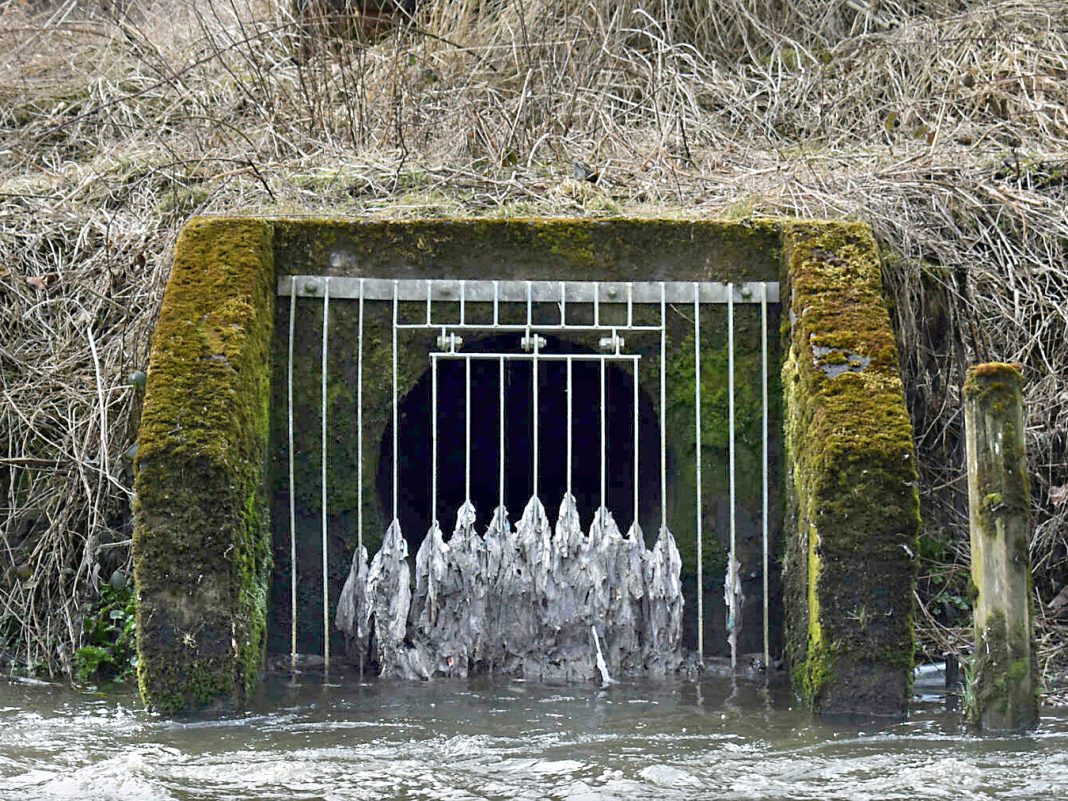Last week, MPs voted to strip out an amendment to the Environment Bill which sought to place a new duty on water companies to reduce raw sewage discharges into rivers. Among these MPs were all our immediate coastal constituency elected representatives; Hastings and Rye MP Sally-Ann Hart, Folkestone and Hythe’s Damian Collins, and Dover’s Natalie Elphicke.
For some, perhaps short-sighted MPs, the public outcry which followed was totally unexpected. But such was the public furore, with outraged environmental campaigners and a furious social media backlash, that on Tuesday night, George Eustice, the environment secretary, announced a government a U-turn, just days after the vote.
The timing of the row, as international delegates arrive for the COP26 UN climate summit, could not be more awkward for those MPs who voted so indiscriminately. Perhaps, our local representatives will think more carefully when they read the anger their vote last week created among the Rye News readership. Our feature writer Alex Thomson makes his views clear on the opinion page, and Revd Paul White, vicar at St. Mary’s church, Rye, responds in a Q&A with Rye News below:
What is your response to MPs voting against the amendment to the Environment Bill that would prevent water companies from continuing to pollute?
Like many people I was shocked and saddened when the news was reported that water companies were not going to be prevented from discharging raw sewage in to our rivers and onto our beaches in certain circumstances.

Last summer it was reported that Southern Water had been fined a record £90 million for illegally discharging untreated human waste at numerous points along the coast and I thought that this marked a turning point in holding those companies to account for polluting our environment. But, sadly, it looks as though they are being given a pass to continue doing so. The reasons for doing this seem to vary from the difficulty of obtaining the necessary chemicals to carry out the treatment of the waste to the cost of maintaining the infrastructure. But, either way, it seems that the convenience and profitability of those companies are being prioritised over not despoiling our rivers and beaches.
How might this affect members of the St Mary’s community and the surrounding wildlife?
Christianity sometimes gets a bad rap in relation to its treatment of the environment, and it is true that previous generations have thought that creation was something that we had to subdue! Times have changed, I am glad to say. Most Christians now see creation as something to be cherished, indeed it is now one of the five marks of mission of the church. Many churches locally are registered as “eco-churches” and the Church of England as a whole has set itself the target of being carbon neutral by 2030. Doubtless, this is ambitious, but I hope it shows that “the church” takes the environment seriously.
In terms of the impact on the wildlife and environment of discharging sewage of course much depends on where and how much. Having said that I am conscious that on one side of the Rother we have Camber Sands and it would devastate the tourism there if the beaches were closed because the water was unsafe and, on the other side, there is Rye Harbour Nature Reserve which could see a severe impact if a high tide brought in a load of human waste into that delicate ecosystem. Not to mention the impact on the rivers themselves and also on the local fisherman. This is an issue that could have a substantial real-world impact close to home.
What message do you think this sends to people in light of the upcoming COP26 conference?
At the time of writing it seems that some significant world leaders will not be attending COP26, so the prospects of a global agreement are not looking great. In one sense the world leaders who do attend may see this issue as a little local difficulty that has little impact in the context of global carbon emissions. On the other hand, it does send a very mixed signal that we are committed to protecting the environment, unless that gets in the way of being profitable.
Do you feel this provides comment on the reality of neo-liberalism?
I have always doubted the wisdom of making basic utilities into private companies that need to make profits for shareholders. Whilst there is much talk about the benefits of competition and freeing up companies to seek investment the reality seems to be that prices go up for consumers and infrastructure lacks investment because the money needed for infrastructure is so big that it would wipe out profits for years. Providing clean water and effective sewage treatment seems like the most basic of utilities and, in my view, it should never have been treated as a profit-making business; the money which has gone from consumers to shareholders in the form of dividends should have been invested in making sure that our beaches are not covered in sewage.
What would you like to see happen going forward?
Our government talks the talk in relation to the environment – Mr Johnson was recently quoting Kermit the Frog and saying that, in his view, it was easy to be green. And, in some senses, they have taken huge strides – the commitment to moving to electric cars is significant. But, if we want to be world leaders on this and set the agenda on issues which will affect us all for generations, then they have to walk the walk even when it is tough and even when it might upset the private companies who control our utilities. The companies which have made huge amounts from our water bills owe it to us not to destroy the maritime environment which surrounds us.
Image Credits: The Rivers Trust http://www.theriverstrust.org , Paul White .




It’s wrong to say the government has performed a U-turn. All they have done is suggest that a report is needed – an assessment of whether reducing sewage overflows is sensible. They are trying to kick this issue into the long grass and hope everyone forgets about it. They are also bandying about ridiculous figures (£150-650 billion to fix the issue – which is completely detached from reality and in any case the investment would be over many years) and are trying to claim this is a choice between sewage flooding peoples homes or going into the sea. There’s clearly a third option – invest in infrastructure and modern catchment techniques such as SuDS: https://www.ciwem.org/policy-reports/a-place-for-suds
This vote is still floating about in Parliament, like a you-know-what. It would be great if the pressure on government were maintained so that our elected representatives understand that a Victorian approach to the environment (that’s who they’re blaming) is no longer acceptable.
Although it is interesting to read Revd White’s comments on this matter, what a shame it wasn’t possible to get any kind of comment from Rye MP Sally-Ann Hart. Sally-Ann Hart seems readily available for positive PR coverage and is regularly featured and photoed for these pages. Let’s hope that her vote (as a coastal MP) to allow sewage to pollute our local seas won’t be forgotten at the next election.
Some years ago I was a main witness in a case brought by ESCC against a Waste Management Company whose operators were collecting thousands of litres of raw sewage from septic tanks all over the area and discharging it untreated onto fields around Guestling. They literally drove it from its source onto grassland grazed by sheep and dairy cattle and dumped it. I still have photographs of this outrage and can testify that it took the grass in those fields years to recover. The company was found guilty, fined and subsequently ceased trading. What, I ask, is the difference between what they did and what the Water Companies seem to have sanction to do? If one polluter is breaking the law then any polluter must be doing so.
I totally agree with the comments of others regarding the necessity for the government to tackle sewage emissions. I have certainly noted the vote cast by my MP against effective environmental policies by Rye MP Sally-Ann Hart.
I wrote to Ms Hart, expressing my concerns about her vote, and received in reply the same Conservative boilerplate response that was used by a host of MPs and which may be found verbatim on her website. This non-apology completely ignores the billions of pounds that the water companies have paid to their investors since privatisation occurred… and also ignores the fact that one of the rationales behind privatisation was that it supposed to prevent the taxpayers from ever needing to pay the bills for improving infrastructure.
I would like to follow-on from Lawrence’s comment. Why no one has picked up on the article in the Financial Times some time ago on Offwat, indicating that the water companies have run up tens of billions in debts, have paid out tens of billions to shareholders and yet my MP, Sally Ann Hart, said that no government could afford hundreds of billions to service the water network. Is that how a capitalist economy works in the UK? Companies give away their earnings and profits to shareholders and then the taxpayer has to step in to do the work that the private sector has neglected? Everyone in this country subsidising through taxation payouts by companies to shareholders?? It would be ridiculous were it not to be happening.
If my memory serves me correctly, when water supply and sewerage treatment were privatised the government stated quite explicitly that the new companies would bear financial responsibility for providing a safe water supply and appropriate sewerage treatment. Clearly this has not been the case nor have they invested in the necessary upgrades over the past many years. Billions have been paid to shareholders, which could have been invested in the water and sewerage systems. I will most definitely hold this issue in mind when I vote in the next election but beyond the election, is it not time that we make water and sewerage publicly owned again? Such is the case across Scotland, Wales, Europe, Canada and even in the USA where local and regional government controls these systems. Some services do better privately owned whilst others do not and these vital services are ones that the public should own.
Ms Hart always votes with the majority Tory dictate regardless of the issue or its effects on the local people.
Ms Hart is clearly more interested in her place in the Tory ranks than representing her constituents or their
interests. If you follow her voting history in the commons this fact is self evident.
We suffered the same previously under Amber Rudd. Who also failed to represent her constituents on crucial issues in Parliament such as protecting local people from the ravages of a flawed universal credit & benefits system.
Southern Water has a terrible history of allowing pollution in our area & it quite evidently values profit over public duty & service. I have past personal experience of this unfortunately.
What the people of Rye & Rother need is an MP who is able to stand up to these companies in parliament & expose their anti social profit orientated dealings. This will not happen until we have an MP who values constituents health & well being over following party political agendas initiated by self interested profiteering business conglomerates.
Huw Merriman MP voted against the Government on this issue. Good on him.
WATER!
What is more basic and fundamental to HUMAN LIFE!
PROFITS.
Profit from water! It is, and always has been UNTHINKABLE.
POLLUTING the environment for the sake of profit.
What kind of people are we to allow this to happen?